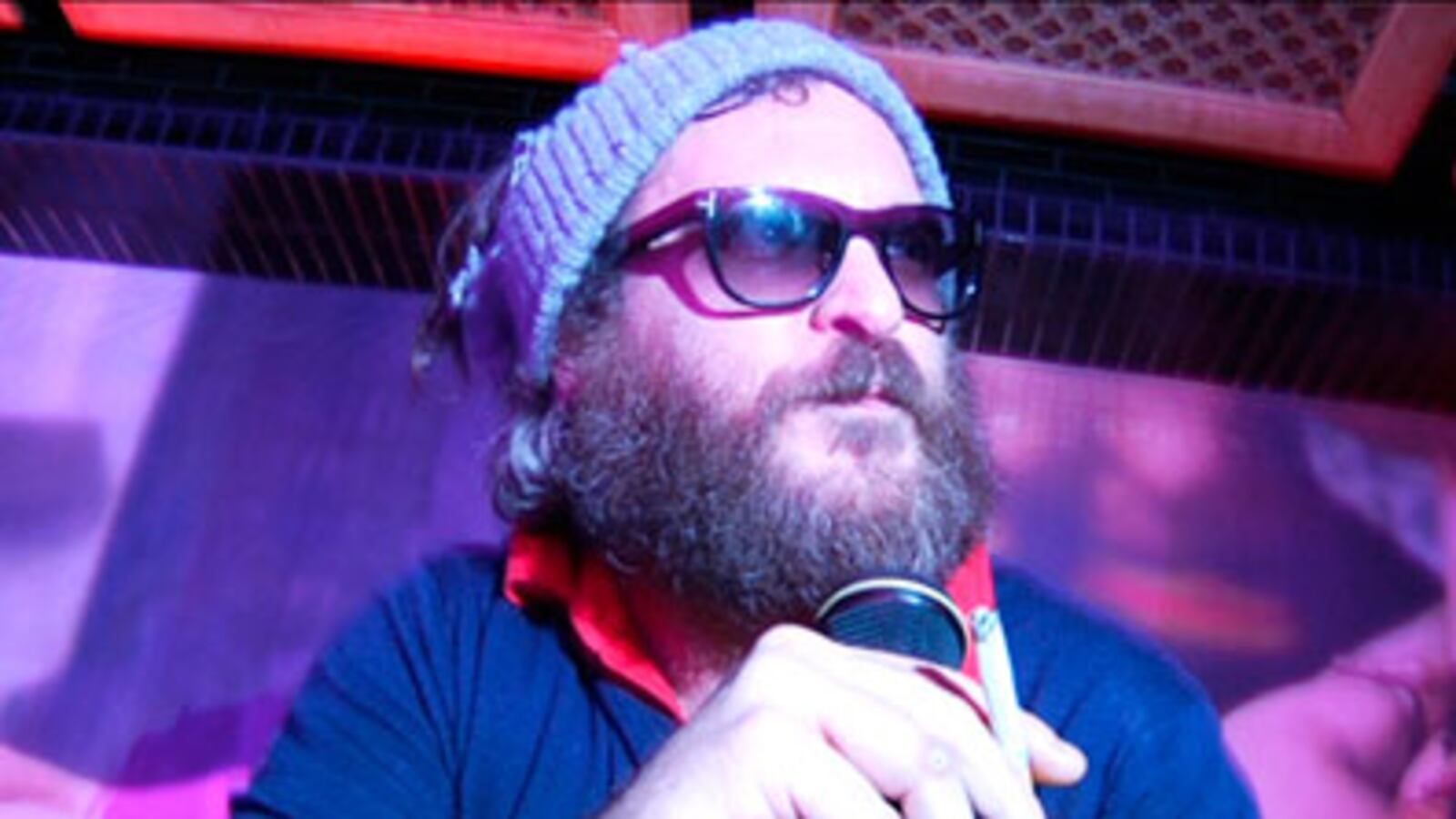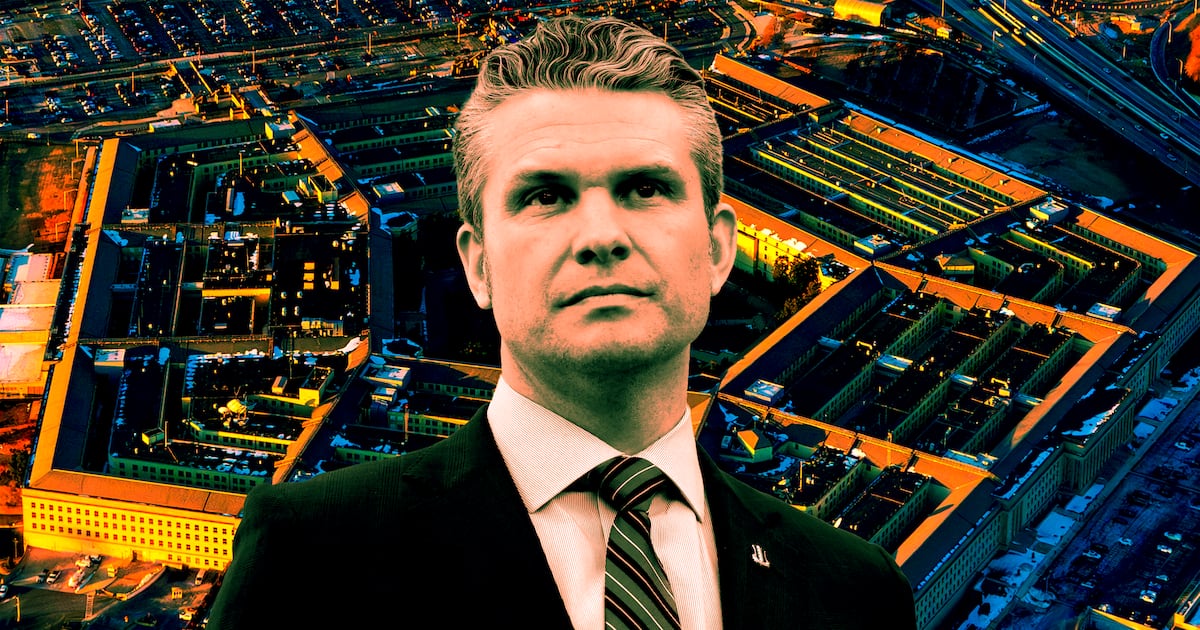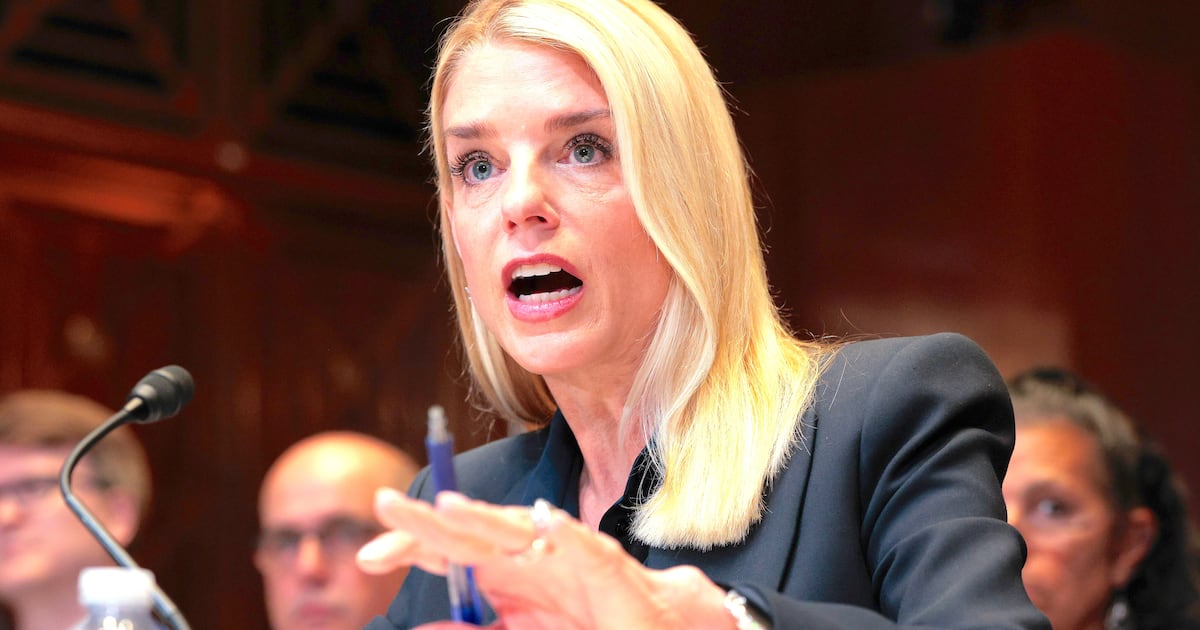There is a telling moment early in Casey Affleck’s unclassifiable film I’m Still Here—before Joaquin Phoenix’s apparently cocaine-fueled tirades, before the bare-breasted prostitutes and the fellatio, before the assistant defecates on Phoenix’s sleeping face –when the two-time Oscar nominee is breaking the news to a red carpet reporter that he has left acting for good.

The camera is trained on Affleck who is looking right at the audience, clearly straining to keep a straight face, setting the tone for what feels like a funny, sometimes hilarious, home movie. Even Phoenix’s publicist Sue Patricola is shown cracking up backstage during Phoenix’s now infamous appearance on CBS’ The Late Show With David Letterman. Not exactly the sign of a true celebrity meltdown.
Affleck structured the film as a yearlong road trip as Phoenix hopscotches around the country—from Los Angeles to Manhattan to Miami to Washington, D.C. to Las Vegas—in a desperate attempt to corner Sean “P. Diddy” Combs into producing his hip-hop record. Their encounters feel scripted, but the writing was clever enough to get laughs out of an industry audience in Los Angeles on Tuesday night.
Indeed, Phoenix and Affleck managed a whole slew of laughably awkward celebrity exchanges in the film. Here’s Phoenix holding a hug with the self-serious Sean Penn just two or three beats too long, performing a song with manic intensity for a concerned-looking Edward James Olmos and looking so disheveled that Mos Def just stares in amazement when the two run into each other at the airport.
The real work for Phoenix happens at his hip-hop gigs, where he has to keep the joke going, Borat-style before inebriated hordes of fans with hand-held video cameras, hungry for some kind of scandal they can post on YouTube.
Here’s a pained Ben Stiller trying to sell Phoenix (who is wearing a T-shirt on his head) on playing his best friend in Noah Baumbach’s film Greenberg, only to have Phoenix accuse him of posturing. “You’re doing Ben Stiller!” he shouts to the befuddled actor. And here’s Phoenix puzzling over what to call Combs (“Do I say Diddy? Mister Combs? Sean?”) then stumbling over his own name when they finally meet.
In one on-going bit, Phoenix name-checks Leonardo DiCaprio as the real movie star, the guy who flies by jet to President Obama’s inauguration while he and his two assistants are crammed into a mini-van, the guy whose film Revolutionary Road got the Oscar nominations when Phoenix’s similarly named Reservation Road was shut out.
The real work for Phoenix happens at his hip-hop gigs, where he has to keep the joke going, Borat-style before inebriated hordes of fans with hand-held video cameras, hungry for some kind of scandal they can post on YouTube. “This is hard,” he tells a small, smirking crowd in Venice, Calif. “I feel a lot of judgment.” After Phoenix leaps into a Las Vegas crowd to attack a heckler (who is not identified in the film), he is hustled to a backstage bathroom where he vomits prodigiously.
The moments of levity and convincing depravity make the film both entertaining and nauseatingly voyeuristic. Far too much of it is spent on Phoenix’s spoiled movie star act, forcing his assistant Antony to trim the actor’s back hair, demanding that his “caretaker” Larry drop to the ground and make a snow angel, berating them both for failing to keep up his supply of cocaine and marijuana, and blaming them for Phoenix’s own failure to set the hip hop world aflame with his talent.
Antony, a slightly built Brit who once had a music career of his own, is the most convincing of the bunch. In one scene, when Phoenix accuses him of leaking stories to the media, he looks believably shaken. Though, it’s hard to say whether he was truly incensed enough to defecate on Phoenix as he slept. (Antony is introduced—presumably months after the drama—from the confines of a rehab facility.)
Though Phoenix becomes a sort of pop-culture monster by the end who has to retreat to his father’s rural Panama home to recover, it’s the vast chattering media that plays the true villain. They are the red carpet photographers who boo Phoenix when he refuses to pose for them. And they’re individual journalists, bespectacled and self-righteous types from Entertainment Weekly, Newsweek, The Boston Herald and the blogosphere. In fact, video blogger “Eddie” (of Eddie’s Hollywood Minute and A Half) delivers a formidable takedown of Phoenix in the film. Indeed it’s so nasty and so conspicuously absent in a Google search, that it may be part of the joke, too.
There’s no question that Phoenix and Affleck initially embarked on this experiment to have a few laughs, mostly at the expense of the public. But in the end, the point of this exercise—that today’s media breeds an especially toxic form of celebrity, perhaps?—hardly seems worth all the trouble. And where exactly does this leave Phoenix’s career?
Even at its most ambitious, I’m Still Here casts Phoenix as a gonzo comedian, even a daring performance artist. But it doesn’t offer an obvious path back to his lauded acting career, does it?
Gina Piccalo spent a decade at the Los Angeles Times covering Hollywood. She's now a contributing writer for Los Angeles Magazine and her work has appeared in Elle, More and Emmy. She can be found at ginapiccalo.com.






